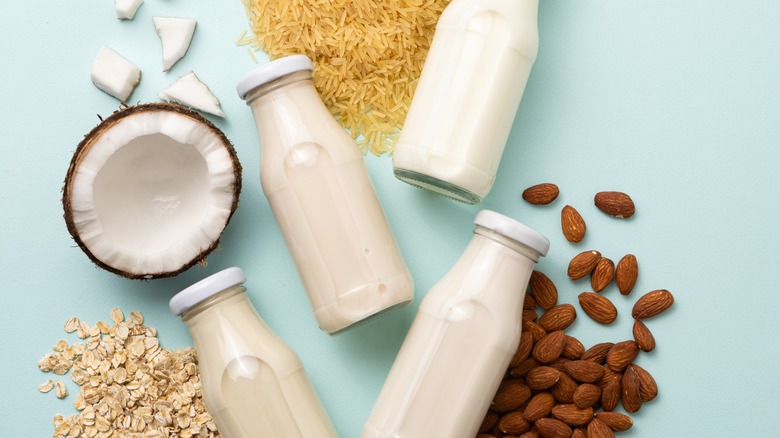How To Prevent Plant Milk From Separating In Coffee
With the abundance of plant-based milks lining grocery store shelves, choosing the right kind for your morning cup of joe — whether you follow a plant-based lifestyle or have dairy sensitivities — can be overwhelming. One of the key issues with using plant milk in your coffee is the curdling effect when the milk makes contact with hot coffee. The reason behind this phenomenon is the heat and acidity of the coffee that denatures the proteins in plant-based milks. Animal-derived dairy, like cow's milk, on the other hand, has phosphates that act as a buffer to the acidity of the coffee, thereby preventing the curdling effect.
However, there are tips to have an enjoyable, dairy-free cup of America's favorite beverage without the unappealing curdling of plant milks. Consider opting for darker roasts, which are typically less acidic than light roasts, and avoid making your coffee too strong as it concentrates the acidity, increasing the chances of a curdled mess. You can also try barista versions of plant milks, which usually contain stabilizers designed to prevent milk from splitting in your coffee. Allowing your coffee to cool down a little, and gently warming your plant milk before combining, is another trick to avoid crying over spilt (or split) milk. If you want to make your own curdle-resistant plant milk, you can blend oats and soaked sunflower seeds with water, then strain the mixture. The combination of oats and seeds creates a more stable emulsion that holds up better alongside hot, acidic coffee.
The environmental impact of plant milks
As part of today's climate discussion, many consumers are motivated to make planet-friendly choices; be it in fashion, the sourcing of food, or shopping for groceries. Studies have shown that plant-based milks generally have a lower environmental impact than conventional dairy milk, in regard to land usage, greenhouse gas emissions, and water consumption. In fact, while almond milk is often criticized for its water usage, dairy milk can require almost twice as much water to be produced. Among the most popular plant-based options, oat milk tends to have one of the lowest environmental impacts overall, and soy milk offers nutritional benefits while using relatively minimal resources. Elevating your latte game with pistachio milk, as well as almond milk or oat milk empowers you to make the best choice for yourself and the planet.
Animal-free milk protein innovator, Perfect Day, is just one of the companies that are pushing the boundaries even further with precision fermentation technology that creates real dairy proteins without cows. The process reduces water consumption by up to 99% and greenhouse gas emissions by up to 97% compared to conventional dairy production. The company's groundbreaking approach, used in its line of milk alternatives called Bored Cow, delivers the same taste and functionality as traditional dairy while reducing the environmental impact tied to traditional dairy farming. Maybe plant milk curdling in coffee will soon be a thing of the past. Until then, cheers to your perfectly blended cup of joe.

